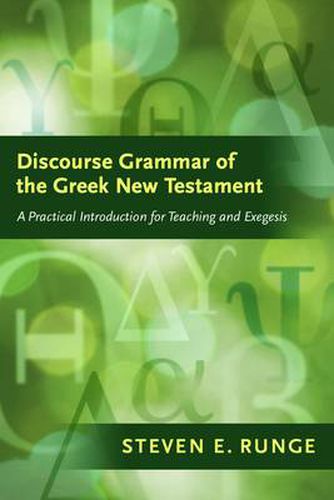Readings Newsletter
Become a Readings Member to make your shopping experience even easier.
Sign in or sign up for free!
You’re not far away from qualifying for FREE standard shipping within Australia
You’ve qualified for FREE standard shipping within Australia
The cart is loading…






In Discourse Grammar of the Greek New Testament, Steve Runge, scholar in residence at Logos Bible Software, explores New Testament Greek grammatical conventions by focusing on the communication tasks they accomplish through discourse analysis. His focus on discourse analysis emphasizes the ways in which words are used in texts and contexts, and has less to do with the elements of speech and focuses, instead, on how humans cognitively process language. In doing so, Runge is consciously building on the ground breaking work of James Barr entitled Semantics of Biblical Language which focused on lexical linguistics (an element of speech) rather than grammatical linguistics. Runge, in effect, picks up from where Barr left off and attempts to show the exegetical significance of discourse grammar for students of the New Testament.
Runge’s project is dynamic and multi-layered. One might even call it a cross-linguistic and function-based approach to discourse analysis that treat aspects of the language often examined in isolation, or only with lip-service. The result, according to Daniel Wallace, is that Runge has made discourse analysis accessible, systematic, comprehensive, and meaningful to students of the New Testament.
As such, Runge’s Discourse Grammar of the Greek New Testament offers direct treatment of linguistic phenomena often truncated or all together mishandled by traditional grammars. Runge provides ample examples from the New Testament to illustrate his points, and does so with accompanying commentary. Everywhere he demonstrates that if there is more than one way of accomplishing a discourse task, there is likely a meaning associated with each choice (148).
In some ways Runge’s book seems like it may be a substitute for traditional grammars. It is not. It is, rather, a grammar that augments specific aspects of the language that traditional grammars often do not have, or choose not to have, room to highlight the importance of discourse analysis for sound exegesis.
$9.00 standard shipping within Australia
FREE standard shipping within Australia for orders over $100.00
Express & International shipping calculated at checkout
In Discourse Grammar of the Greek New Testament, Steve Runge, scholar in residence at Logos Bible Software, explores New Testament Greek grammatical conventions by focusing on the communication tasks they accomplish through discourse analysis. His focus on discourse analysis emphasizes the ways in which words are used in texts and contexts, and has less to do with the elements of speech and focuses, instead, on how humans cognitively process language. In doing so, Runge is consciously building on the ground breaking work of James Barr entitled Semantics of Biblical Language which focused on lexical linguistics (an element of speech) rather than grammatical linguistics. Runge, in effect, picks up from where Barr left off and attempts to show the exegetical significance of discourse grammar for students of the New Testament.
Runge’s project is dynamic and multi-layered. One might even call it a cross-linguistic and function-based approach to discourse analysis that treat aspects of the language often examined in isolation, or only with lip-service. The result, according to Daniel Wallace, is that Runge has made discourse analysis accessible, systematic, comprehensive, and meaningful to students of the New Testament.
As such, Runge’s Discourse Grammar of the Greek New Testament offers direct treatment of linguistic phenomena often truncated or all together mishandled by traditional grammars. Runge provides ample examples from the New Testament to illustrate his points, and does so with accompanying commentary. Everywhere he demonstrates that if there is more than one way of accomplishing a discourse task, there is likely a meaning associated with each choice (148).
In some ways Runge’s book seems like it may be a substitute for traditional grammars. It is not. It is, rather, a grammar that augments specific aspects of the language that traditional grammars often do not have, or choose not to have, room to highlight the importance of discourse analysis for sound exegesis.